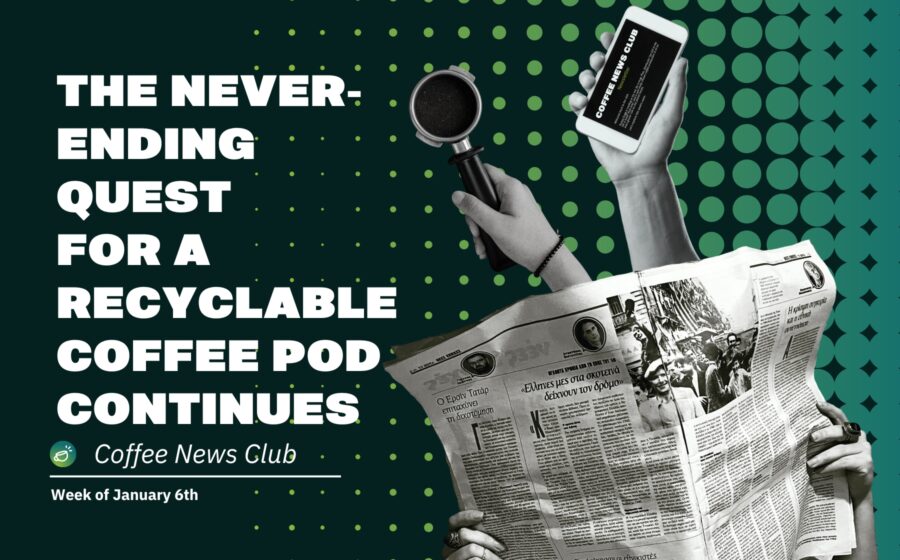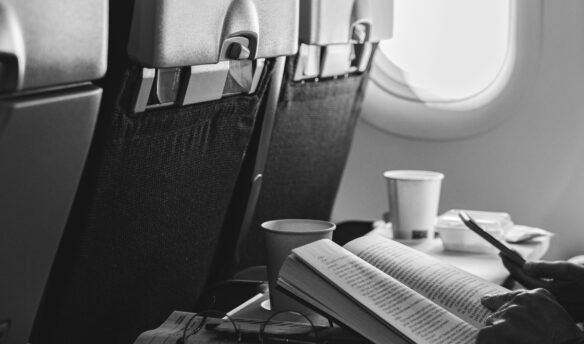The quest for a more recyclable coffee pod continues. Plus, erratic weather plagues Kenyan coffee farmers, and two new studies to add to the “coffee is good for you” column.
‘Kenya’s Celebrated Coffee Under Threat as Farmers Hit by Climate Change’ – via BBC News
Climate change affects coffee production worldwide—we covered some of the most startling recent examples in our 2024 news recap. A report by Ismail Einashe for the BBC zoomed in on one region in Kenya to illustrate the impact erratic weather and climate shocks can have on coffee farmers.
“Climate change is a major challenge for our coffee farmers,” John Murigi, chairman of the Komothai Coffee Society, a cooperative representing 8,000 farmers in Kenya’s Kiambu County, told Einashe. Rainfall patterns are unpredictable, the weather is getting hotter, and coffee pests and diseases are increasing. This means that “coffee production has decreased over the last few years,” Murigi said. Farmers are turning to chemicals to fight back, which can then pose long-term health and environmental risks.
Murigi’s observations are backed up by a recent Fairtrade International survey, which found that 93% of Kenya’s coffee farmers already deal with the impact of climate change on their farms.
There are many coffee farms in the Komothai region, and unreliable rainfall means producers have to take water from rivers to process their harvests. Farmers are planting more shade trees to reduce water usage, Einashe reports, but the increased reliance on rivers puts pressure on their community’s water supplies.
Coffee is vital to the livelihood of many Kenyans. “We call coffee the black gold around here,” coffee farmer Simon Macharia told Einashe. Due to climate change, coffee production in Kenya is becoming increasingly difficult, and farmers are expressing doubt about the future. “Right now, as things stand, I don’t think any parent wants their child here farming coffee,” Macharia said.
‘Why It’s So Hard to Create a Truly Recyclable Keurig Coffee Pod’ – via Popular Science
Single-serve pod coffee machines are extremely popular. Forty million U.S. households have a Keurig machine, while another 38 million own a Nespresso brewer. And you can see why: they’re very convenient—pop in a pod, press a button, and receive a single cup of coffee. But their sustainability is up for debate.
Although a 2023 study found that pod brewers were the most sustainable way to brew coffee because of the small amount of coffee and water they use, pods create a lot of waste. (That study only looked at emissions from coffee production and brewing and didn’t consider the packaging waste created by pods.) Keurig and Nespresso tout that their pods can be recycled, but there’s a difference between “can” and “are.” Keurig has paid fines and faced lawsuits over recyclability claims, while Nespresso states that its global recycling rate is about 32%.
Both companies are exploring alternatives to plastic packaging. Last year, Keurig launched plastic-free and compostable coffee pucks, K-Rounds, while Nespresso is using more aluminum, which is easier to recycle than plastic, in its pod composition. However, these solutions present new problems: Keurig’s coffee pucks aren’t compatible with older brewers and require users to invest in new equipment, while Nespresso’s aluminum pods use a proprietary design that won’t work with other pod-based machines (and still need to be recycled).
According to Frida Garza, reporting for Popular Science, one of the hurdles any single-cup brewing company might face is how to recycle pods. Garza looked broadly at why coffee pods are so hard to recycle. A big problem is that pods are often too small for recycling facilities to handle—not to mention the fact that millions of Americans don’t even have access to an appropriate recycling facility for pods.
Garza also reports that this leaves room for third parties to get involved in the single-cup brewing game.
For example, Cambio is a new company that sells Keurig-compatible aluminum pods. Cambio’s founder and CEO, Kevin Hartley, calls the pods “the most exciting innovation in coffee since the K-cup.”
Cambio’s solution is to have consumers stack several pods together before recycling them, thus making them large enough for the recycling machinery. Cambio is working with recycling companies to test the pods’ compatibility and developing a device to allow users to bundle pods together easily.
Perhaps legacy capsule companies are beginning to feel the pressure. Aside from its compostable K-Round machine, Keurig says it is “lightweighting our pods to reduce the amount of plastic used” and “increasing options for recycling them.”
Any coffee brewer creates waste, but the popularity and sheer number of pod machines mean finding more sustainable options is necessary. If you’re really into the convenience a single-cup brewer provides, Garza points out that “any coffee maker can be single-serve if you use only the water and coffee grounds you actually need.”
More News
‘Coffee Prices Retreated Further on Monday, Some Analysts Forecast Arabica Futures Above $4 in 2025’ – via Communicafe
‘That’s That Me Espresso’: Dunkin’ Unveils Sabrina Carpenter-Inspired Drink’ – via USA Today
‘Indian Coffee Exports Surpass $1bn for the First Time’ – via World Coffee Portal
‘La Marzocco Presents Tour de Coffee, a Cycling Journey Through the Coffee Trails of Ethiopia’ – via Communicafe
‘Filipino Scientists Made Concrete Blocks with Coffee Grounds’ – via Philippine Daily Inquirer
The Week in Coffee Unionizing
Last month, staff at Common Ground Cafe in Baltimore, Maryland, voted to unionize. A story about coffee workers unionizing isn’t by itself remarkable, but what makes this move unique is that those who voted to unionize are also members of the cafe’s worker-owner cooperative.
The story starts in late 2022, when workers at Common Ground began their union drive, looking to secure better working conditions, pay, and healthcare. Six months later, with just a day’s notice given to staff, Common Ground’s owner closed the cafe permanently.
But the workers didn’t give up. The cafe’s 19 staff members worked with a local non-profit to form a cooperative and bought the company, reopening two months later as a worker-owned coffee shop.
According to a press release from United Food and Commercial Workers Local 27, by becoming a cooperative, the workers achieved “many of the original union demands, proving the power of worker solidarity.”
A cooperative ownership model differs from a union because it gives workers shared control of a business rather than standing in opposition to a company’s owner. The Common Ground worker-owners continued to pursue unionization because they recognized “the importance of union affiliation for long-term workplace benefits, protections, and political power.”
Unions can offer worker-owners more protections and create affiliations with nationwide organizations such as UFCW that bring access to education and financial resources. The unionization vote, the press release stated, “demonstrates the potential for innovative labor partnerships, even within worker-owned cooperatives.”
Is Coffee Good For You?
This week, two new studies show how coffee could protect against both head and neck cancer and cognitive decline.
First up, a study from the University of Utah’s Huntsman Cancer Institute looked at the link between coffee and tea consumption and the risk of developing head and neck cancer (HNC), a collective term for cancers that form in places like the mouth, throat, and salivary glands.
The study, published in the journal Cancer found that compared with non-coffee drinkers, those who consumed more than four cups of coffee a day saw a 17% reduction in HNCs as a whole and a 22% reduction in oropharyngeal cancers (tissues that affect the middle of the throat). Different numbers of cups per day were also associated with reductions in cancer risk while drinking decaf was associated with a 25% reduction in the risk of developing oral cavity cancer.
“While there has been prior research on coffee and tea consumption and reduced risk of cancer, this study highlighted their varying effects with different sub-sites of head and neck cancer, including the observation that even decaffeinated coffee had some positive impact,” said co-author Yuan-Chin Amy Lee in a statement.
Meanwhile, a study published in the Journal of the American Heart Association found that drinking more than five cups of coffee each day helped older people with atrial fibrillation perform better on cognitive tests. Atrial fibrillation (AFib) is a quivering or irregular heartbeat and is a risk factor for cognitive decline and dementia.
Those who consumed the most coffee were found to have higher cognitive test scores, and their cognitive age was calculated to be nearly seven years younger than those who consumed the least coffee. “Many myths are around, but our study found no reason to discourage or forbid a patient with AFib from drinking coffee. Instead, say, ‘Enjoy, it may even be good for you!’” said Jürg H. Beer, M.D., senior author of the study.
Beyond the Headlines
‘The Best of Coffee News Club 2024’ by Fionn Pooler
‘Thanks A Latte: Sampling Rwanda’s Coffee Hub’ by Chanel Retief







